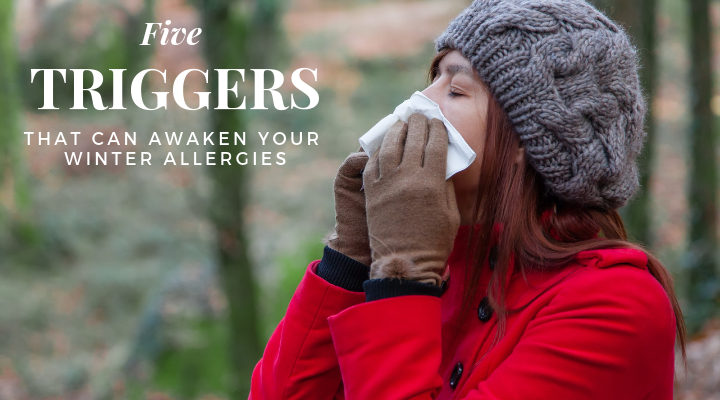Just because the snow has started to fall that doesn’t mean you’ll get a break from allergic reactions. While some do experience relief in the winter months, some don’t and many people experience worse flare-ups. By recognizing the most common causes of winter allergic reactions, you can take steps to avoid or minimize attacks.
Pet Dander
If you think you might be allergic to your pets, the best way to know for sure is to visit an allergist, such as Dr. Summit Shah, so you can be tested. If pet dander does provoke a reaction, you’ll likely see a worsening of your symptoms in the colder months. This is because pets spend more time indoors and the windows and doors are kept closed. This concentrates your exposure to pet dander. To help alleviate the situation, regularly vacuum your carpets and clean the pet’s bedding.
Mold
While mold is flourishing outside, it can also find places to thrive in your home. Areas, such as the basement and bathrooms, where there’s excess moisture, are prime locations for mold. Additionally, walking through damp leaves or handling damp firewood can cause you to track mold into the home. Once inside, it may spread and cause a larger problem. To minimize allergic reactions to mold and mildew, try to leave outerwear and footwear in a closet or on an enclosed porch. You should also take steps to dry out moist areas in the home, so any mold that does develop won’t be able to exist for long.
Dust Mites
There’s no off-season for these culprits. Dust mites can live in your home all year round, though reactions to them will often be worse in the winter months. They thrive in bedding, carpets, and upholstered furniture. To get rid of them, clean your home regularly and pay special attention to fabrics and upholstery. It may be worthwhile to steam clean your carpets in the fall or winter to get rid of any dust mites lingering in the carpet fibers.
Cockroach Droppings
While wives tales suggest cockroaches are only attracted to unsanitary living conditions, this simply isn’t true. Cockroaches can be found in almost any home and will mostly gather in the bathrooms and kitchens, where access to water and food is more common. For this reason, it’s important to keep food securely contained and to wash dishes and eating utensils before using them.
Hiring a pest control service to spray in and around your home is a good way of making your home inhospitable to cockroaches. Also, fix leaky pipes and faucets. If your basement has any cracks or open crevices, repairing them can also limit access to your home for cockroaches and other pests.
Mild Climates
Another cause of winter allergies that most people don’t think about is a change in weather patterns. When your environment benefits from a spike in the temperatures, snow and ice will melt. This uncovers the grass, leaves, and plants that spread pollen and other natural allergens. If the weather gets warmer and your allergy symptoms worsen, employ the same practices you use to minimize symptoms in the spring and fall. Change your clothes as soon as you get home, bathe or wash your face and hands, and limit exposure to the outdoors. An over the counter medication may also help.
Depending on your situation, you may be able to handle winter allergies with a few lifestyle changes. If your symptoms are more severe, you may need to consult your doctor. Taking steps to minimize your allergy symptoms will help you feel better and experience more enjoyment from your favorite seasonal activities.




